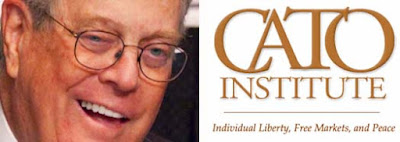by Nomad
Cato, Then and Now
As a humble peasant, it always fills me with awe when billionaires with agendas begin to lob insults at one another. I don't have to particularly agree with one or the other, it's just nice to believe there are some cracks in a global conspiracy against the little guy.If you are unfamiliar with the Cato Institute, here's the run down for you.
Founded by Charles G. Koch and funded by the brothers Koch, Cato is a libertarian think tank headquartered in Washington. By and large, it has promoted policies that uphold "the traditional American principles of limited government, individual liberty, and peace."
The Koch family has donated more than $30 million dollars to the organization, according to the New York Times as of 2012. In March of that year, there was a falling-out when the Kochs filed a lawsuit against Cato to gain control.
The Cato Institute wields a tremendous amount of influence among conservatives. In addition to its advocacy of far right positions, it has become a substantial funder of other "like-minded" think tanks For all those reasons, Cato is an organization that any president ought to take seriously. tanks around the U.S.
Any endorsement of criticism of Mr. Trump and his policies should be understood to come solidly from the conservative right.
Any endorsement of criticism of Mr. Trump and his policies should be understood to come solidly from the conservative right.
Refuge of Scoundrels
On many subjects, such as climate change denial, school privatization, privatization of government services and anti-taxation, the Cato Institute's position and the Trump administration's agenda seem to dovetailed pretty tightly.That's why a recent article by Cato's Daniel Ikenson, director of Cato’s Herbert A. Stiefel Center for Trade Policy Studies, seems so counter-intuitive. Are these power-hungry Republic-destroying fat cats supposed to be working together?




